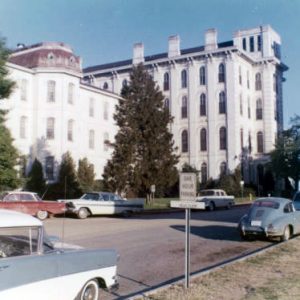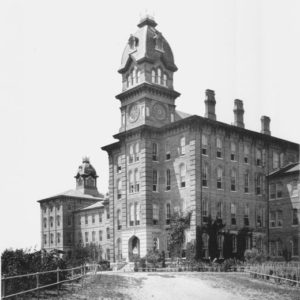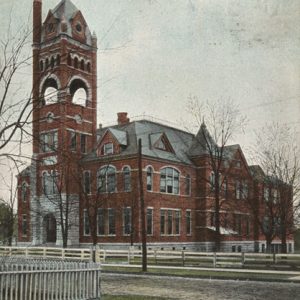calsfoundation@cals.org
Mental Health
Prior to the opening of the Arkansas Lunatic Asylum (now the Arkansas State Hospital) in 1883, mentally ill Arkansans were cared for by their families or housed in jails, prisons, or poor farms. Since 1883, the Arkansas State Hospital (ASH) has been responsible for the treatment of thousands of Arkansans with a wide range of psychiatric diagnoses such as depression and schizophrenia. In the 1950s, the hospital’s census peaked at 5,086 patients. Since that time, the deinstitutionalization movement and advances in psychotropic medications have resulted in dramatically lower inpatient numbers. The ASH capacity of 234 beds in 2010 represented a deinstitutionalization rate of 97.5% for the state. Most patients are admitted through a screening process conducted by the state’s fifteen community mental health centers (CMHCs). These CMHCs provide a variety of services ranging from outpatient treatment to crisis stabilization. Also in the Arkansas Department of Human Services is the Arkansas Health Center (formerly Benton Services Center), a 350-bed psychiatric nursing home. The facility provides services to special needs groups and individuals with cognitive dysfunction.
Arkansas has several other state- and federally-funded treatment facilities, including the Veterans Affairs (VA) system, the University of Arkansas for Medical Sciences (UAMS), and Arkansas Children’s Hospital (ACH). The VA system was an early source of mental health treatment beginning shortly after World War II, and the Arkansas VA centers are no exception. The North Little Rock Veterans Administration Hospital at Fort Logan H. Roots began psychiatric treatment in 1947, and the Little Rock VA began providing psychiatric services after its completion in 1950. Today, the Central Arkansas Veterans Healthcare System (CAVHS) serves around 275,000 veterans and specializes in such areas as addictions, post-traumatic stress disorder, and rehabilitation.
UAMS is another major treatment center serving a large catchment area. It provides a number of inpatient and outpatient services and specializes in addictive, eating, anxiety, depressive, and post-traumatic stress disorders. The Psychiatric Research Institute (PRI), which opened in 2009, emphasizes research, education, and clinical services. The PRI houses the Walker Family Clinic’s outpatient services as well as a forty-bed inpatient facility treating children and adults. A twenty-eight-bed satellite facility of the PRI provides similar services to residents of northwest Arkansas. The Child Study Center, another UAMS entity providing a wide range of mental health services, is based at Arkansas Children’s Hospital. Additionally, STRIVE is a school-based community outreach program that provides intensive outpatient services to children and adolescents with significant behavioral and emotional problems.
Mental health intersects with other entities in Arkansas, most notably the criminal justice system and the Division of Developmental Disabilities. Evaluation for mental illness for those accused of criminal acts was codified into Arkansas law in 1937. Subsequent to Act 911 of 1989, a conditional release program was established for defendants acquitted by reason of mental disease or defect. Started in 1994 under the supervision of the Division of Mental Health Services, the Act 911 program currently operates from the ASH Social Work Department. Licensed social workers serve as monitors for defendants residing in the community on a conditional release order while they serve a probationary term of at least five years.
The intersection of mental health and developmental disabilities is an area where Arkansas lagged behind the nation. As one of the last two states to establish separate facilities for children with mental retardation, it was not until the groundbreaking of the Arkansas Children’s Colony (now the Conway Human Development Center) in 1958 that children with developmental disabilities were educated and treated in a less-restrictive, specialized setting, rather than being housed in unsafe buildings on the ASH campus. Some early advocates for improving the conditions and care for children were Dr. Elizabeth Dishongh Fletcher, ASH’s first female physician; A. Nils Florentz, a parent-advocate and member of the Arkansas Council on Children and Youth; and state Senator Max Howell. In recent years, psychiatric treatment facilities observed an increase in the number of patients admitted with developmental disabilities, including mental retardation and autism spectrum disorders. In response to this change in patient population, ASH opened the Adolescent Dual Diagnosis Treatment Unit in October 2007 for adolescents with a developmental disability in addition to behavioral, emotional, or psychiatric problems.
Mental health treatment has historically been limited outside of the Little Rock (Pulaski County) area. For example, in 1966, seventy-five of the eighty-five psychiatrists in the state practiced in the Little Rock area. Even today, after the establishment of numerous treatment centers, most major facilities are in or near Little Rock. Currently, the area has a number of private hospitals that serve both adult and child populations, including Rivendell, the Bridgeway Hospital, and Methodist Behavioral Hospital, in addition to UAMS and ASH. The Arkansas Children’s Hospital and Pinnacle Pointe specialize in child and adolescent services. Little Rock is also home to a number of the major mental health professional organizations such as the Arkansas Psychiatric Society, the Arkansas Psychological Association, and the National Association of Social Workers—Arkansas Chapter. Recent estimates suggest that the state has a total of 202 board-certified psychiatrists, 518 psychologists, 382 psychological examiners, and 2,874 social workers.
In addition to their traditional roles as clinicians, numerous Arkansas mental health professionals participate in activities such as research and training. The VA system, UAMS, and Arkansas Children’s Hospital account for the majority of the research conducted in the area. Some of the major areas of research include substance abuse, clinical service delivery, childhood nutrition, and studies using functional Magnetic Resonance Imaging (fMRI), a neuroimaging technique that maps brain activity by measuring changes in blood flow. Many of these facilities also serve as training sites. UAMS has medical training, a psychiatry residency program, and specialized fellowships with a significant portion of clinical training taking place in other sites such as the VA, ASH, and ACH. Little Rock is also home to three psychology pre-doctoral internship programs as well as a number of post-doctoral fellowships. Additionally, the University of Arkansas (UA) system and the University of Central Arkansas offer a number of undergraduate and graduate programs for mental health professionals such as psychologists, social workers, special education teachers, and psychiatric nurses.
For additional information:
Arkansas Division of Behavioral Health Services. Arkansas Department of Human Services. https://humanservices.arkansas.gov/divisions-shared-services/aging-adult-behavioral-health-services/about-daabhs/ (accessed February 14, 2022).
Arkansas Psychological Association. http://www.arpapsych.org/ (accessed February 14, 2022).
Arkansas State Medical Board. http://www.armedicalboard.org (accessed February 14, 2022).
Baker, Max L., ed. Historical Perspectives: The College of Medicine at the Sesquicentennial. Little Rock: Arkansas Sesquicentennial Commission, 1986.
Central Arkansas Veterans Healthcare System. U.S. Department of Veterans Affairs. http://www.littlerock.va.gov/ (accessed February 14, 2022).
Cuffel, Brian J. “Violent and Destructive Behavior among the Severely Mentally Ill in Rural Areas: Evidence from Arkansas’ Community Mental Health System.” Community Mental Health Journal 30 (October 1994): 495–504.
Gettinger, Aaron. “Finding Black Therapist Hard for Some.” Arkansas Democrat-Gazette, May 8, 2023, 1A, 6B. Online at https://www.arkansasonline.com/news/2023/may/08/finding-black-therapist-often-hard-for-some/ (accessed May 8, 2023).
Hampton, Ashan R. “History of the Arkansas State Hospital.” Pulaski County Historical Review 43 (Spring 1995): 2–18.
Henker, Fred O., III. “The Evolution of Mental Health Care in Arkansas.” Arkansas Historical Quarterly 37 (Autumn 1978): 223–239.
McGregor, Loretta. “Menta Health Awareness for Black Women and Girls in the Delta: An Interview with Clinical Psychologist Dr. Patricia Griffen.” Arkansas Review: A Journal of Delta Studies 54 (December 2023): 211–215.
National Association of Social Workers—Arkansas Chapter. http://www.naswar.org/ (accessed February 14, 2022).
Shen, Ce, Michael A. Smyer, Kevin J. Mahoney, Dawn M. Loughlin, Lori Simon-Rusinowitz, and Ellen K. Mahoney. “Does Mental Illness Affect Consumer Direction of Community-Based Care? Lessons from the Arkansas Cash and Counseling Program.” Gerontologist 48 (February 2008): 93–104.
Shores, Elizabeth F. “‘Idiots and Imbeciles’: Children with Mental Retardation and Arkansas State Hospital, 1883–1958.” Pulaski County Historical Quarterly 44 (Spring 1996): 2–20.
Psychiatric Research Institute. University of Arkansas for Medical Sciences. http://psychiatry.uams.edu/ (accessed February 14, 2022).
Brittani Baldwin Gracey
Little Rock, Arkansas
Hillary R. Hunt
Little Rock, Arkansas
 Elam, Lloyd Charles
Elam, Lloyd Charles Health and Medicine
Health and Medicine Human Development Centers
Human Development Centers Kimbrough, Wilson Whitaker, Jr.
Kimbrough, Wilson Whitaker, Jr. Levi Hospital
Levi Hospital Mental Health Council of Arkansas
Mental Health Council of Arkansas AABPP Members
AABPP Members  Arkansas State Hospital
Arkansas State Hospital  Arkansas State Lunatic Asylum
Arkansas State Lunatic Asylum  Kramer School
Kramer School 




Comments
No comments on this entry yet.